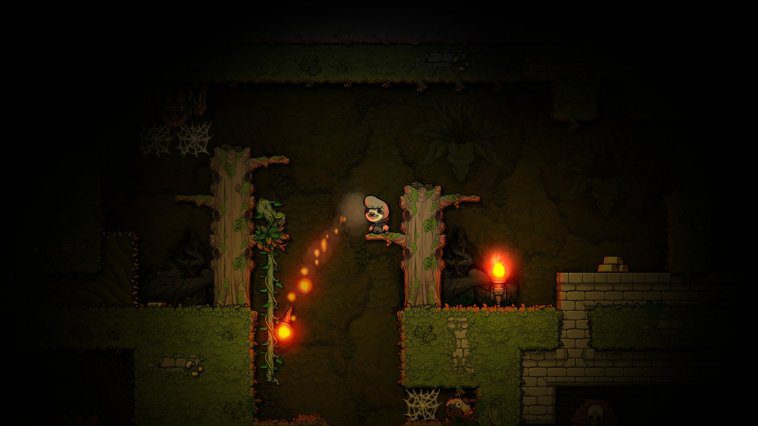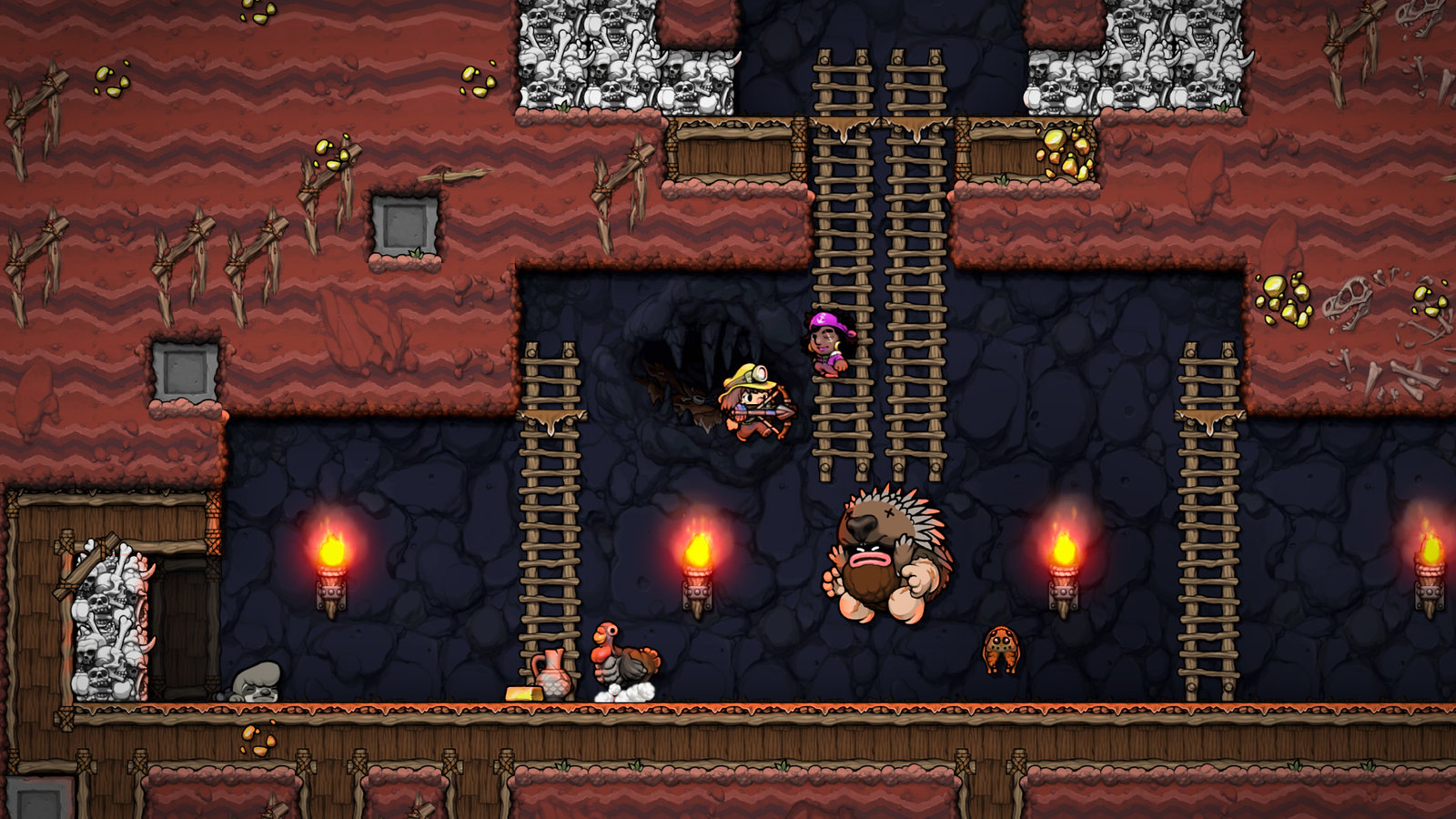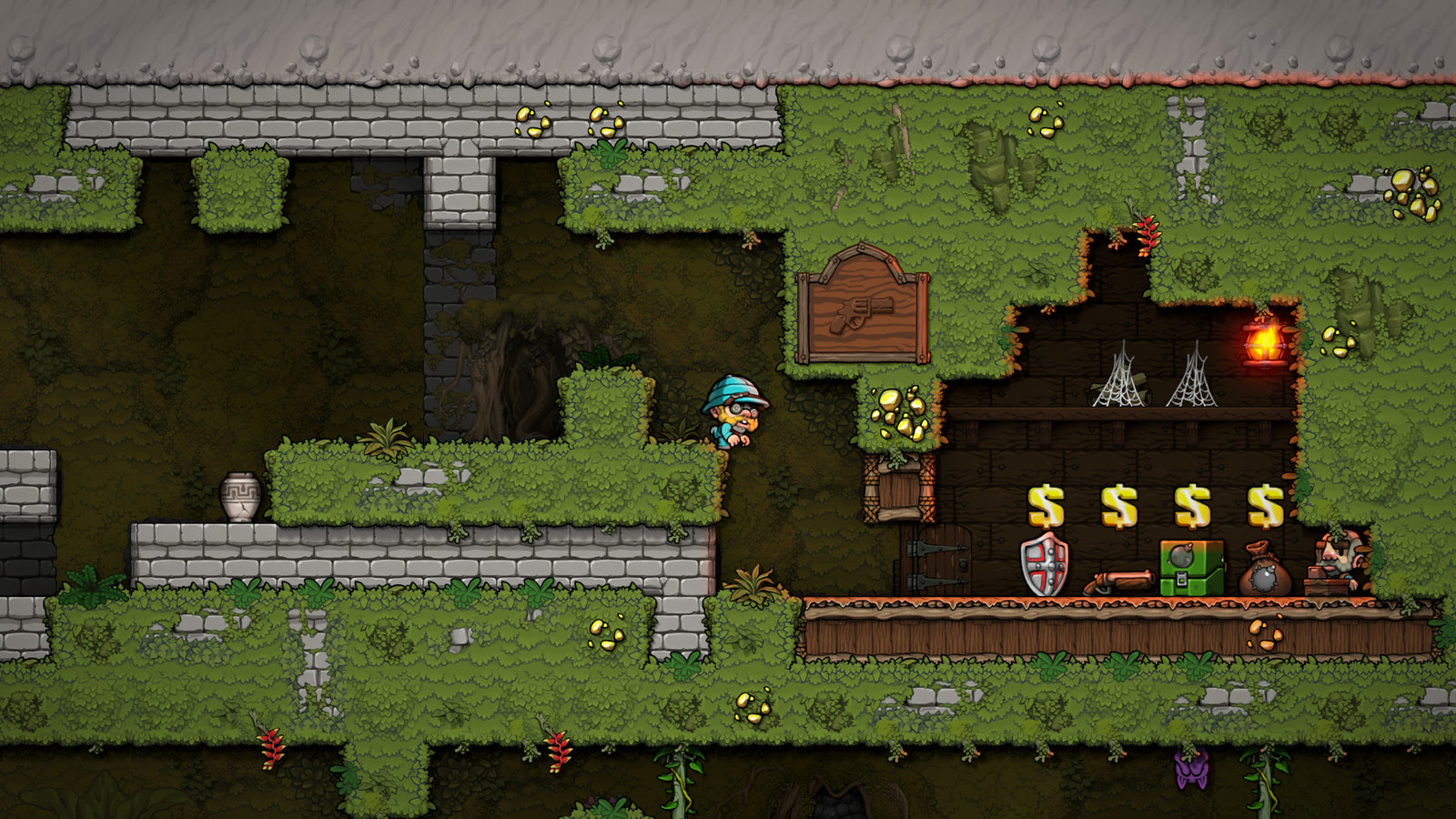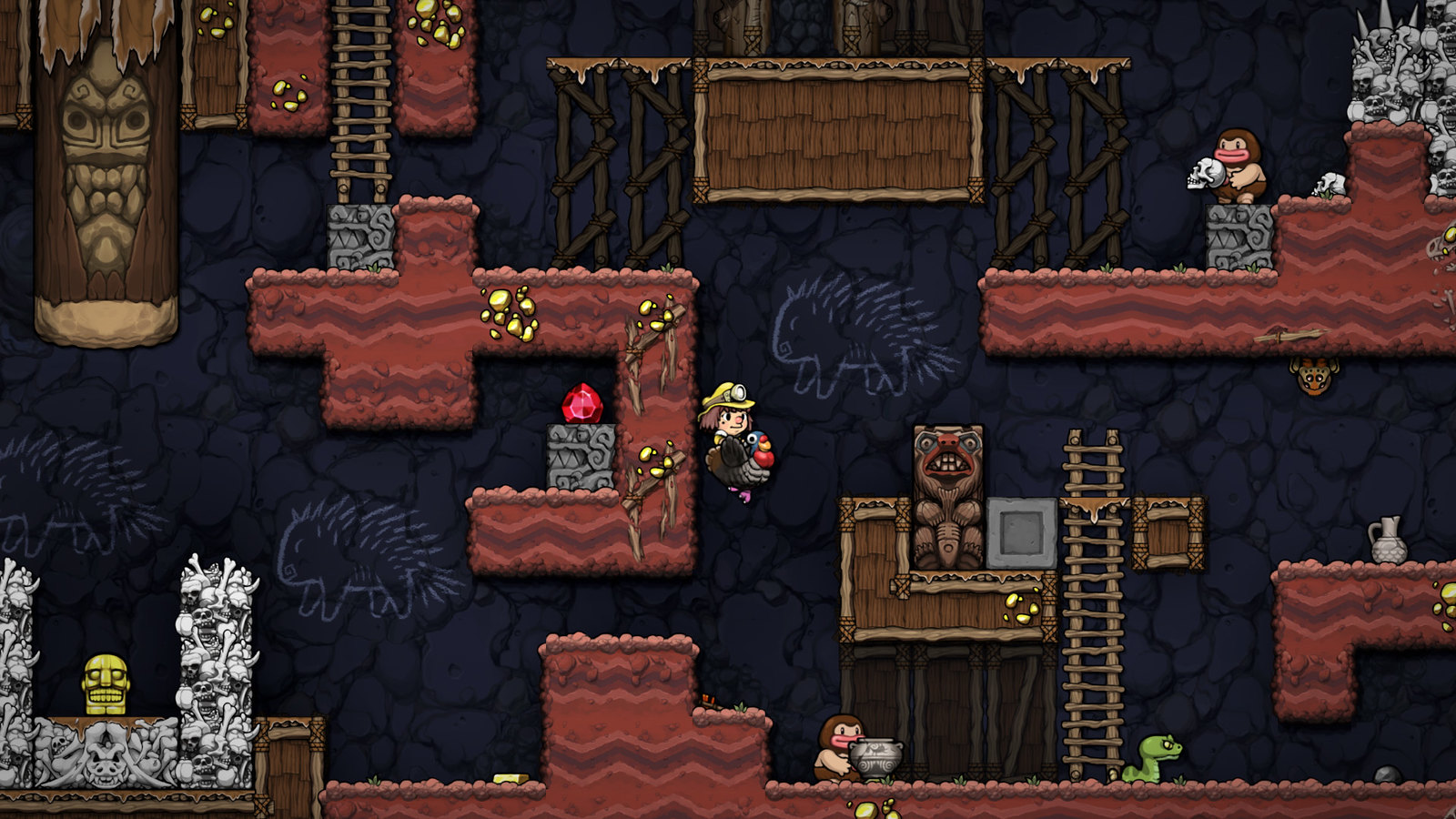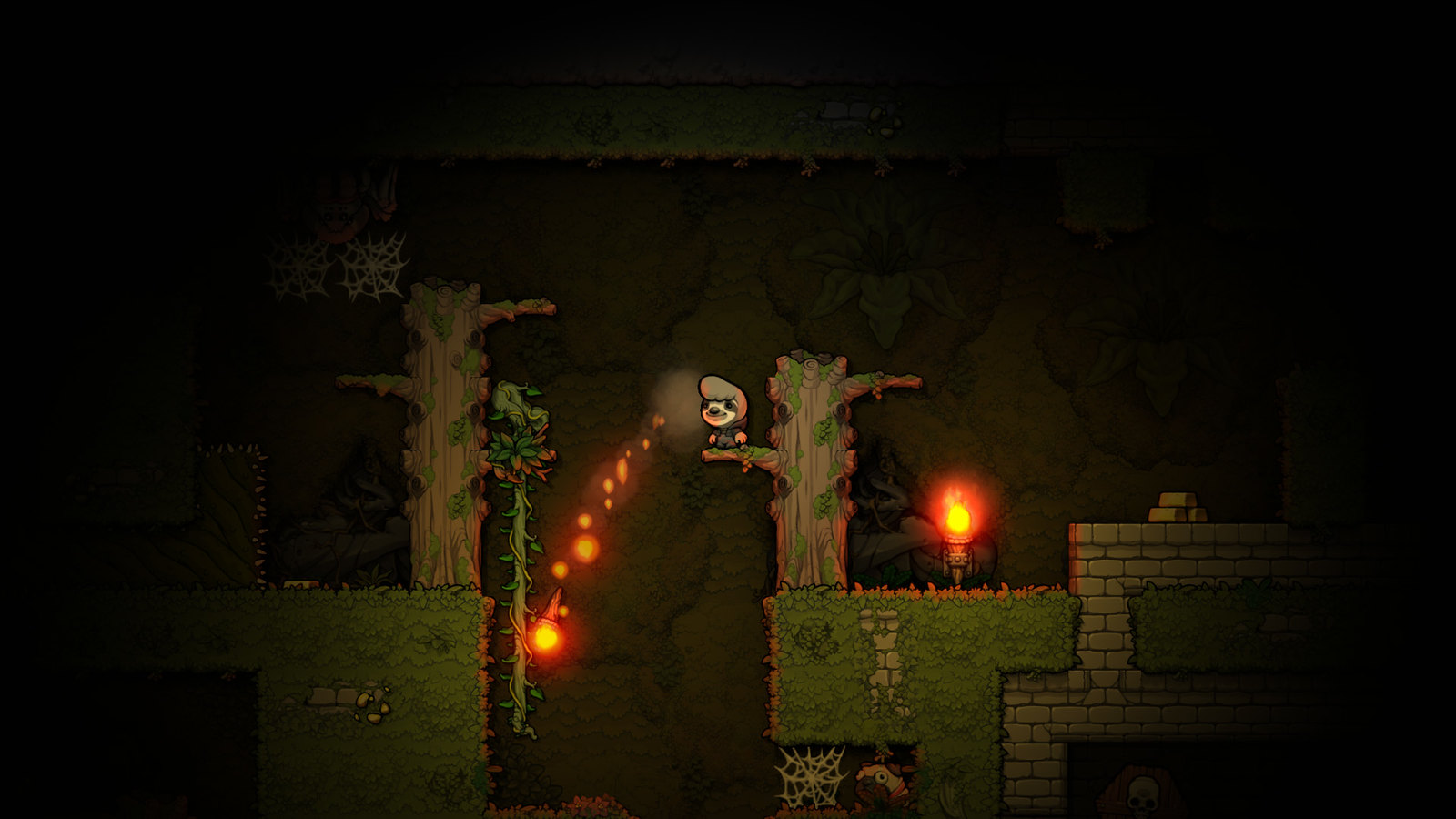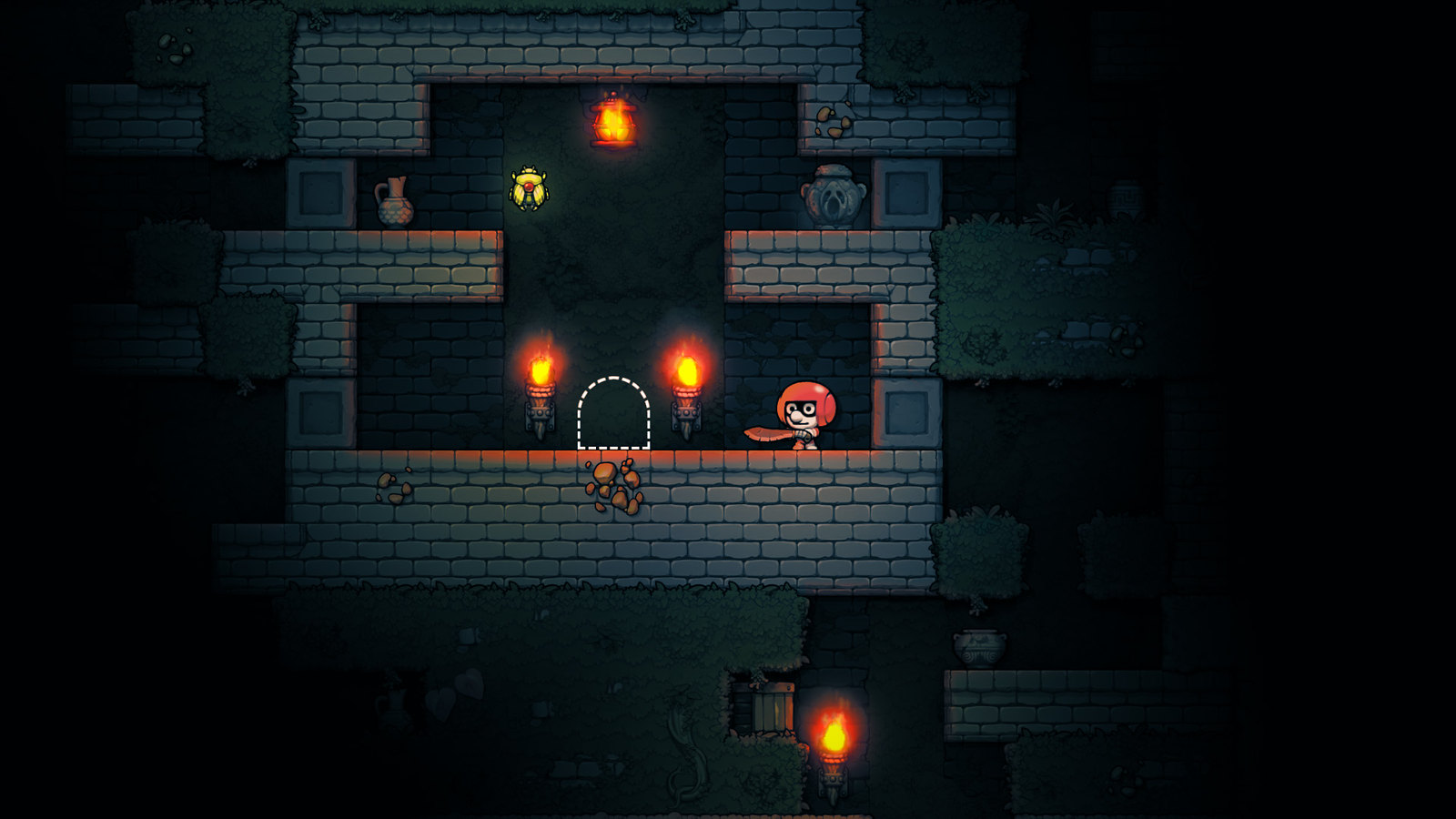Hello again, explorers! Many moons ago — seven years ago to the day, it turns out — I penned a Spelunky HD survival guide of beginner tips and tricks on this very blog, based on my countless (779, on PS4 alone) journeys into the Caves and far beyond.
Well we’ve finally arrived at the altar of Spelunky 2 — the sequel to one of the best, most quietly influential games of all time — and after some meaningful time spent with a pre-release copy, I’m ready to share some learnings. That is to say, a handful of tips — some tangible, others philosophical — for both returning players and those brand-new to the depths. Steel yourself: the walls are shifting…again…
- Get ready to be bad. Whether this is your first time playing or you’re a thousand hours into the franchise, don’t make the mistake of thinking that Spelunky 2 is like other games — even Spelunky HD. Sure, you’ll need some dexterity and mechanical proficiency to get more than a few minutes into it, but the other half of progress in a Spelunky game is learning how everything fits together. The level pieces that are generated and how it feels to move between them, the behaviors of the enemies, the ways they interact with each other, the differing amounts of damage everything can do to you, etc. etc. etc. You’re just going to be bad for some amount of time until you start to internalize a critical mass of information — so don’t get frustrated. Just accept it up front, and enjoy the immeasurable reward that lies at the nexus of becoming good at the game and starting to understand how it fits together.
- ABG: Always Be Gathering. My original Spelunky HD guide began with the tip to always be carrying something — a rock, an arrow, a rat — to set off traps and throw at incoming enemies. While this is still important and is regularly a lifesaver, the small ambient level creatures (dung beetles in the first world, for example) no longer set off arrow traps, and there are a couple more ways to dodge or absorb that damage now. But even more important this time around is to gather every scrap of gold and every gem you see (or find by breaking pots, especially the “ghost jar” if you can smash it safely near a level’s exit). Why? Because the items you can buy in Spelunky 2’s shops are even more useful/varied/fun, and you’ll want to be able to afford the good stuff when you see it.
- What was old is made new again. Per the above, Spelunky 2’s equippable items are incredibly useful — not just the new additions (the Power Pack is an especially fun-if-chaotic way to level yourself up), but particularly the redone items from the first game. The Compass is immensely helpful in guiding you toward the exit in unfamiliar/tense new worlds like the redone Jungle, and now also points to (some) hidden exits for when you start to plumb the game’s many arcane secrets. The Boomerang now does a bang-up job of returning to you after more complex throws, and is surprisingly affordable in a shop. The Climbing Glove no longer auto-sticks to surfaces (you have to hold a button to opt in), removing the one flaw from one of the game’s best items. And also note some small downgrades for items like the Shotgun, which now has recoil even when hanging from ropes/vines/chains (unless you have the aforementioned Power Pack). And lastly the Cape is now surprisingly important for…reasons. 😉
- Back to basics. As cool and important as all the extra spelunking tools are, a good spelunker knows that the most critical tools in their roster are the ones they start with: a whip, some bombs, and some ropes (and maybe a little bit of grit). And to get the most out of them, you need to understand exactly how they work. It will become a gut thing over time, but the whip has a very specific range and “hit box” — one that’s notably different from Spelunky HD — and it requires approaching some enemies differently than others. Perhaps you’d like to try hitting bats with a backward-facing “back-whip”? Bomb radiuses are also a bit different than they were in Spelunky HD, and knowing how far away you need to be for safety — or how many blocks you can blast through — can save an otherwise doomed run. As for ropes, don’t forget that you can use them to hit enemies above you in a pinch, and — surprise! — angry shopkeepers can now scurry up them to get you (which can also be a helpful tool in the right situations).
- Bird’s the word. The new mounts you can ride in the game are as helpful as they are fun, and the sooner you can make them a regular part of your Spelunky vocabulary, the better. This mostly applies to the Turkeys you’ll find in the first world, which — once tamed — give you a double jump, absorb a few hits of damage for you, and can be carried around like a feathery suitcase when it’s not convenient/safe to ride them around an obstacle. They take some getting used to, but it’s worth the time investment. And if nothing else, you can roast them up with a torch or a bomb for some delectable life-giving hearts. Take care mounting the Rock Dog in the Volcana world — but if you can pull it off, fire-breathing and fire-immunity (for the mount, not you) await.
- Torches: the new rocks. Many of Spelunky 2’s new enemies take multiple hits to kill, so the standard rock is a bit less useful than it once was (beyond setting off traps, which it’s still great for). Thrown arrows don’t break when passing through lesser enemies like bats anymore, but I’d ESPECIALLY recommend getting to know your new best friend: the torch. You can pick one up by whipping any campfire, and they do 2 points of damage when lit — and you can relight one by touching it to any lit wall sconce. You can even use a torch to cook turkeys (you monster), and take out the first mini-boss in a few throws. Don’t underestimate the humble torch!
- Let The Path come to you. For new players, I’d recommend doing your best to take it slowly (though not more-than-three-minutes slow, lest the ghost show up) and observe the routines of enemies, conveyor belts, etc. before you rush into them. Let the unexpected become the expected, and avoid unpleasant surprises by being a fly on the wall until you’re reading to take the lowest-risk next steps. (Especially for the moles in the first world — watch their patterns and just let them run their course — it’s rarely worth engaging them.) For experienced players, The Path means something entirely different. And you know what? You’ll solve it eventually, and every step of the way will be a wonderful new revelation. But try to avoid the FOMO of not solving it immediately, or being the only way you’re allowed to conquer the game. Just delight in the joy that is Spelunky, and spend your time getting good again. It will take longer than you think, and you’ll be all the better equipped to tackle its more furtive challenges. Which leads me to…
- Start a Spelunky pod! Pods are all the rage in this weird world of ours (is that why Spelunky 2 is set on the moon?), so why not find a few pals with whom to plumb the depths together? You can learn so much by just having a friend watch and make suggestions, or take turns doing runs. I haven’t tried proper online co-op as of this writing, but I have to assume it’s excellent. But beyond that, try your best to not dive headfirst into Spelunky 2 spoilers and secrets online, since they are myriad, and discovering them in-game — or working through them as a small group — is deeply satisfying. Remember when you didn’t know everything about everything all the time? Remember sharing rumors and theories with friends down at the arcade? Spelunky 2 is the perfect game for that, so at least for the first few weeks, talk amongst yourselves…and perhaps not on the internet. And if you don’t have such a pod in your life, I’ll mention a different sort — the podcast that I host, Eggplant: The Secret Lives of Games (formerly The Spelunky Showlike), on which we’re starting a deep-dive miniseries on Spelunky 2 this Friday (09/18) — so if nothing else, you can listen in and play along with us.
And that’s it! Spelunky 2 is just a treasure trove of brilliant design, challenges, laughs, secrets, and well, treasure. And I hope you now feel slightly more equipped for your journey. Godspeed, explorers!
P.S. Special thanks to my co-hosts Zach Gage, Doug Wilson, and Andy Nealen, and also Colin Northway for their contributions! And to Derek Yu for not only his wonderful game, but for sanctioning this post.
Website: LINK

